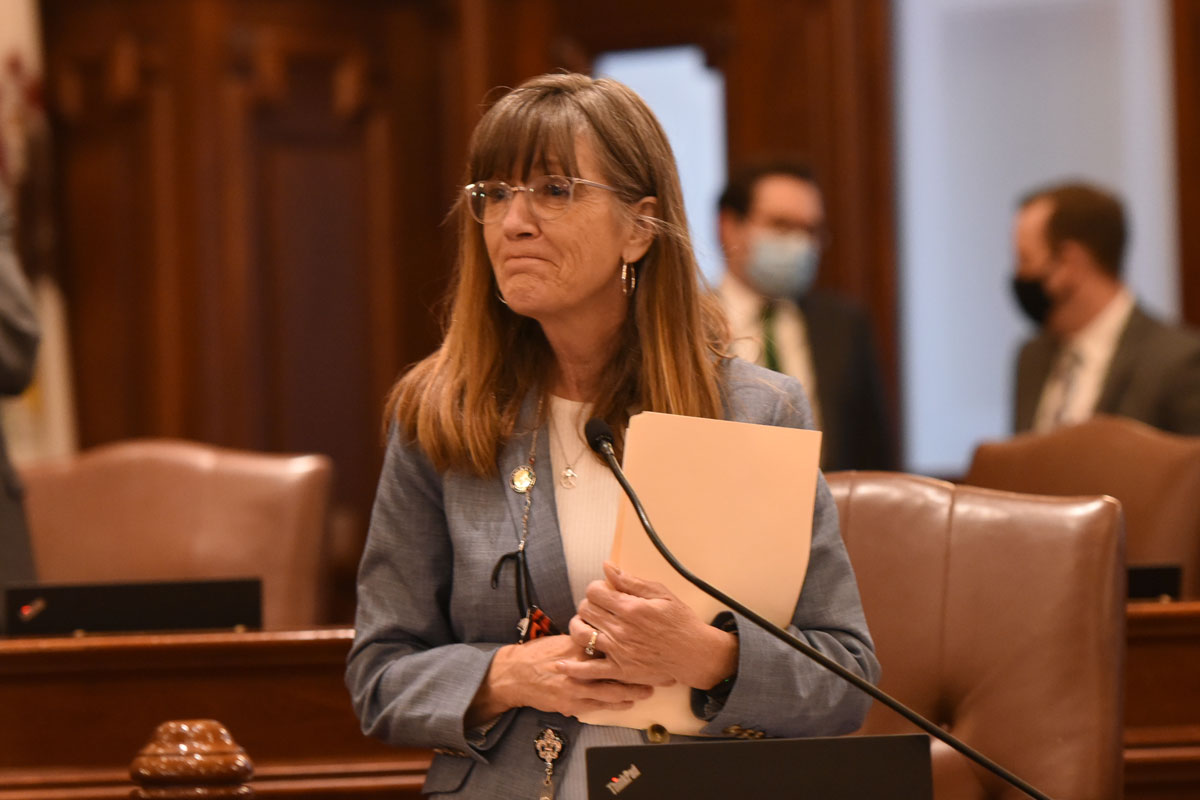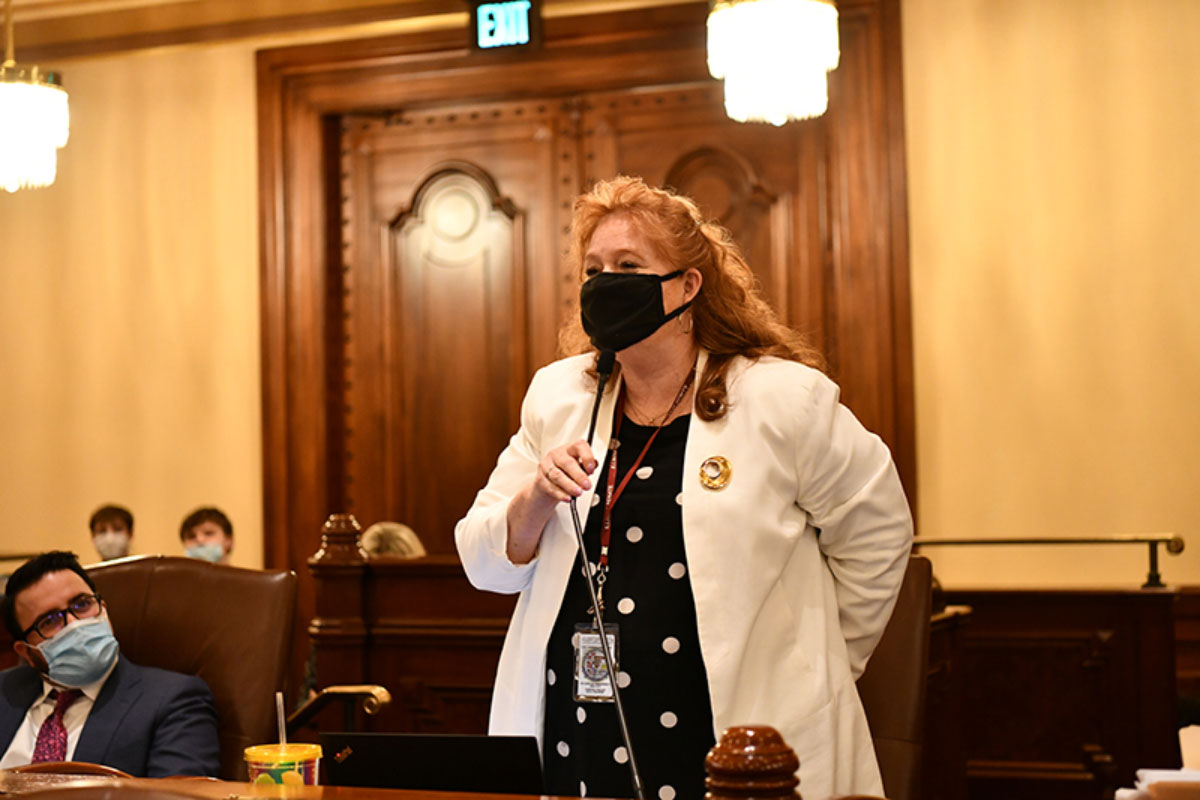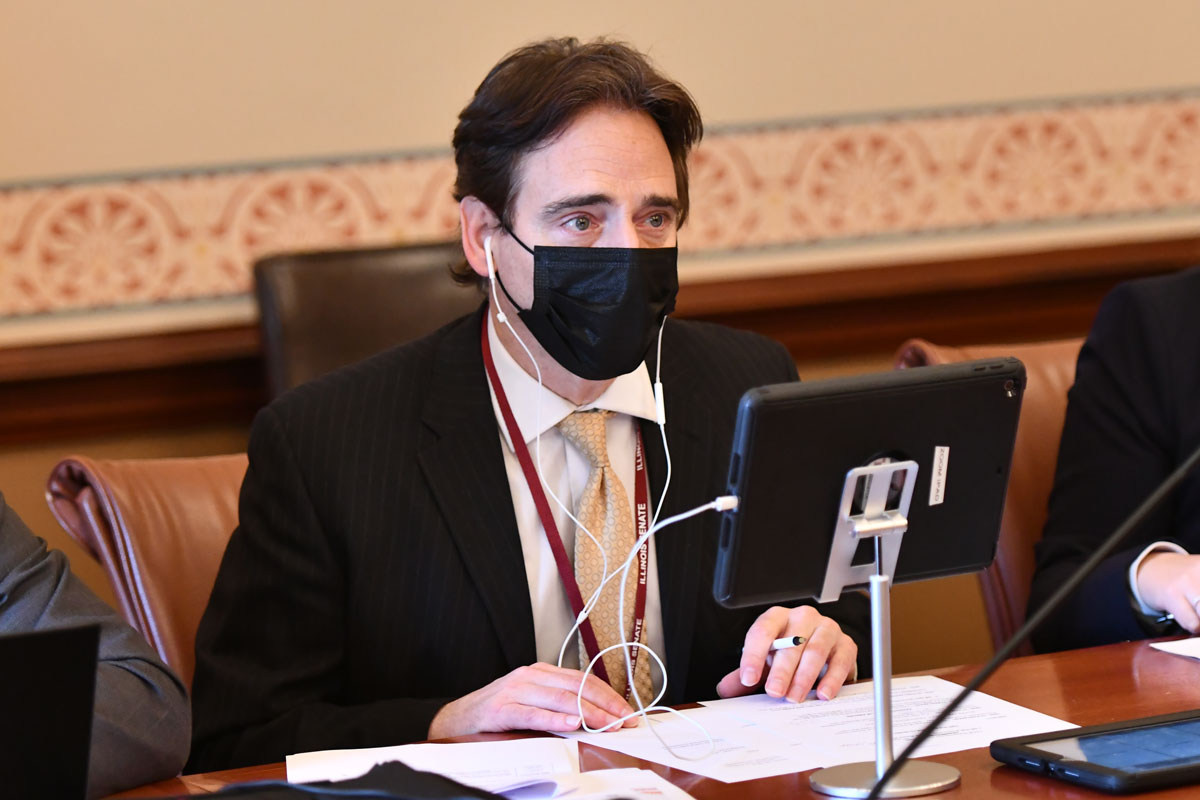- Details
- Category: Senator Cristina Pacione-Zayas News
 SPRINGFIELD – In response to the Senate’s passage of comprehensive clean energy legislation, State Senator Cristina Pacione-Zayas (D-Chicago) released the following statement:
SPRINGFIELD – In response to the Senate’s passage of comprehensive clean energy legislation, State Senator Cristina Pacione-Zayas (D-Chicago) released the following statement:
“As extreme weather conditions currently threaten thousands across this country, we must realize that a 100% renewable energy future is not a dream, but an imperative. I’m proud to see Illinois take action to definitively end our reliance on fossil fuels that also protects communities that have been historically and systematically marginalized and harmed by the practices of corporate polluters.
Read more: Pacione-Zayas celebrates passage of landmark energy legislation
- Details
- Category: Senator Robert Martwick News
 SPRINGFIELD – State Senator Robert Martwick (D-Chicago) believes energy legislation that passed the General Assembly today takes firm steps to address climate change by setting deadlines for increased clean energy use and, fossil fuel-burning plant closures, as well as establishing incentives to speed up the adoption of electric vehicles.
SPRINGFIELD – State Senator Robert Martwick (D-Chicago) believes energy legislation that passed the General Assembly today takes firm steps to address climate change by setting deadlines for increased clean energy use and, fossil fuel-burning plant closures, as well as establishing incentives to speed up the adoption of electric vehicles.
“Climate change is everyone’s problem,” Martwick said. “If we don’t act now, our children and grandchildren will face an increasingly harsh world, dominated by heat, extreme weather, droughts, and water scarcity.”
The legislation, Senate Bill 2408, would set a goal of a 100% clean energy economy in Illinois by 2050. It also would establish deadlines along the way for the adoption of more renewable energy and the closure or conversion of fossil fuel-burning plants. To help encourage more people to purchase electric vehicles, it would create a consumer rebate and incentives to build more charging stations in locations across the state.
The comprehensive measure also would create a number of safeguards for Illinois’ energy consumers, helping lower costs and increase utility company accountability. For example, it would formally empower the Illinois Commerce Commission to investigate ComEd – and any other utility companies found guilty of criminal behavior – and impose penalties that could include returning money to customers. It also would ban the practice of charging “convenience fees” for customers who prefer to pay using debit or credit cards rather than enrolling in auto-pay or direct bank transfers.
“We not only need to fight climate change, we need to modernize Illinois’ entire utility system,” Martwick said. “That means creating good-paying clean energy jobs and requiring utility companies to accept common forms of payment without charging extra fees.”
The legislation, which now goes to the governor for his signature, is expected to create or preserve tens of thousands of good-paying jobs in the clean energy economy, supported by a robust network of training programs.
- Details
- Category: Senator Robert Peters News
 SPRINGFIELD – State Senator Robert Peters (D-Chicago) praised the energy plan that passed the General Assembly Monday, saying it will help fight climate change and transition Illinois to a renewable energy economy that includes minority workers.
SPRINGFIELD – State Senator Robert Peters (D-Chicago) praised the energy plan that passed the General Assembly Monday, saying it will help fight climate change and transition Illinois to a renewable energy economy that includes minority workers.
“I represent a district that borders Chicago’s lakefront, and we’re seeing the results of climate change now,” Peters said. “Changing water levels are causing increased erosion and endangering parks, businesses, and homes on Lake Michigan. But, those are just short-term effects – in the long term, we’re talking about making sure humans can still live on the planet.”
Read more: Peters praises energy plan that fights climate change
- Details
- Category: Senator Melinda Bush News
 “Across the state, people have been left wondering when lawmakers and stakeholders would step up to the plate to protect the environment,” Bush said. “Finally, after years of fighting the clean energy battle, there is hope. I am proud to have supported the most forward-thinking energy legislation this country has seen.”
“Across the state, people have been left wondering when lawmakers and stakeholders would step up to the plate to protect the environment,” Bush said. “Finally, after years of fighting the clean energy battle, there is hope. I am proud to have supported the most forward-thinking energy legislation this country has seen.”
The comprehensive energy plan sets Illinois on a path toward 50% renewable energy by 2040 and 100% renewable energy by 2050. Municipally owned coal- and natural gas-fired power plants would also have to reduce their carbon emissions to zero by 2045.
The measure creates the Energy Transition Barrier Reduction Program to support people impacted by the transition, as well as the Energy Transition Assistance Fund to provide money to workforce development and just transition programs. New wind and solar installations to power communities across the state will also support employees in the energy sector by creating thousands of new jobs.
“We are prioritizing equity, providing job resources and training for communities that have historically been left out of the process,” Bush said. “As we continue down this road, moving away from dirty energy – as we continue to move forward – we are making sure there’s something to help the communities that depend economically on traditional power generation facilities.”
The measure passed the Senate Monday and now heads to the governor’s desk for final approval.
- Details
- Category: Senator Laura Murphy News
 SPRINGFIELD – A plan to revamp Illinois’ energy industry and put the state on track to renewable electricity production has passed the General Assembly with support from State Senator Laura Murphy (D-Des Plaines), who said the groundbreaking legislation makes Illinois a national leader on fighting climate change while empowering current and future employees in the energy industry.
SPRINGFIELD – A plan to revamp Illinois’ energy industry and put the state on track to renewable electricity production has passed the General Assembly with support from State Senator Laura Murphy (D-Des Plaines), who said the groundbreaking legislation makes Illinois a national leader on fighting climate change while empowering current and future employees in the energy industry.
“Climate change threatens our health, our homes and our way of life. For the sake of our children’s and grandchildren’s futures, we need bold strokes,” Murphy said. “This landmark plan makes historic investments in local jobs and homegrown renewable energy generation to put Illinois at the forefront of the green energy movement.”
The historic plan would set Illinois on a path toward 50% renewable energy by 2040 and 100% renewable energy by 2050. New workforce training programs would help prepare current power plant employees for long-term, good-paying careers in the green energy industry.
The comprehensive measure also would create a number of safeguards for Illinois’ energy consumers, helping lower costs and increase utility company accountability. For example, it would formally empower the Illinois Commerce Commission to investigate ComEd – and any other utility companies found guilty of criminal behavior – and impose penalties that could include returning money to customers. It also would ban the practice of charging “convenience fees” for customers who prefer to pay using debit or credit cards rather than enrolling in auto-pay or direct bank transfers.
“It’s time to put people—not utility companies—first,” Murphy said. “Illinois is showing the rest of the nation what’s possible when it comes to climate action and clean energy.”
Senate Bill 2408 now awaits the governor’s signature.
- Details
- Category: Senator Steve Stadelman News
 SPRINGFIELD – Following the passage of a groundbreaking renewable energy package that preserves local jobs at the Byron Generating Station nuclear plant, creates new career opportunities in the energy sector and trains workers for the future of the industry, State Senator Steve Stadelman (D-Rockford) released the following statement:
SPRINGFIELD – Following the passage of a groundbreaking renewable energy package that preserves local jobs at the Byron Generating Station nuclear plant, creates new career opportunities in the energy sector and trains workers for the future of the industry, State Senator Steve Stadelman (D-Rockford) released the following statement:
“Thousands of people across the state rely on power plants for their livelihoods, including many employees at the Byron nuclear plant on Rockford’s back doorstep. As we make the transition to green energy, we have to make sure these Illinoisans aren’t left in the dark.
“I’m proud to support an energy transition plan that prioritizes economic stability for our working families in the long term, protecting existing jobs while training our labor force to seize the opportunities of the future of energy.
“Illinois is now on the path toward an independent and prosperous power generation industry that values the people at Byron Generating Station and across the state who go to work every day to keep our lights on.”
- Details
- Category: Senator Adriane Johnson News
 SPRINGFIELD – Following the Illinois General Assembly’s passage of a comprehensive energy policy overhaul package, State Senator Adriane Johnson (D-Buffalo Grove) said it’s a sign Illinois is finally stepping up to protect the communities most vulnerable to pollution and climate change:
SPRINGFIELD – Following the Illinois General Assembly’s passage of a comprehensive energy policy overhaul package, State Senator Adriane Johnson (D-Buffalo Grove) said it’s a sign Illinois is finally stepping up to protect the communities most vulnerable to pollution and climate change:
“We’re already seeing the catastrophic effects of climate change right here in Lake County: heat waves, more intense storms and rising water levels on Lake Michigan are threatening households across the community. Low-income neighborhoods and neighborhoods of color have borne the brunt of air and water pollution for decades, and their health has suffered.
“But thanks to Senate Bill 2408, our future looks brighter. Illinois now has a plan to transition to 100% renewable energy by 2050 in a way that protects jobs and creates new opportunities for Black and Brown Illinoisans looking to enter the green energy industry.
“Good energy policy is about people, not fossil fuel companies. I’m proud to support this groundbreaking green energy plan and help Illinois move forward into a better future.”
- Details
- Category: Senator Michael E. Hastings News
 SPRINGFIELD – Legislation that would make Illinois a national leader in reducing carbon emissions, fight climate change, and preserve jobs passed the Senate Monday.
SPRINGFIELD – Legislation that would make Illinois a national leader in reducing carbon emissions, fight climate change, and preserve jobs passed the Senate Monday.
State Senator Michael E. Hastings (D-Frankfort), who serves as chair of the Senate Energy and Public Utilities Committee, led legislative negotiations for the Senate Democratic Caucus.
“Today’s historic agreement is the culmination of a difficult, but worthwhile negotiation process where we refused to accept anything less than the best for Illinois’ clean energy future,” Hastings said. “Our work product is one that is renewable, reliable, and affordable for all Illinoisans.”
More Articles …
Page 407 of 769